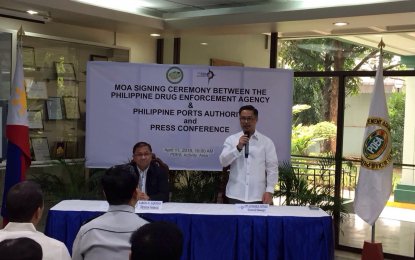News
PDEA, PPA renew partnership vs. drug smuggling in ports

Santiago, the two agencies agreed to hold regular meetings and dialogues for the purpose of improving cooperation, facilitating coordination and fast-tracking the prosecution of personalities involved in drug-related cases in the seaports. (Photo courtesy: PDEA-PIO)” width=”415″ height=”260″ />
Through a Memorandum of Agreement (MOA) signed by PDEA Director General Aaron N. Aquino and PPA General Manager Jay Daniel R. Santiago, the two agencies agreed to hold regular meetings and dialogues for the purpose of improving cooperation, facilitating coordination and fast-tracking the prosecution of personalities involved in drug-related cases in the seaports. (Photo courtesy: PDEA-PIO)MANILA — In a bid to intensify its all-out campaign against illegal drugs in the country, the Philippine Drug Enforcement Agency (PDEA) and the Philippine Ports Authority (PPA) on Wednesday have renewed their alliance to curb trafficking of illegal drugs and controlled chemicals through the ports.
Through a Memorandum of Agreement (MOA) signed by PDEA Director General Aaron N. Aquino and PPA General Manager Jay Daniel R. Santiago, the two agencies agreed to hold regular meetings and dialogues for the purpose of improving cooperation, facilitating coordination and fast-tracking the prosecution of personalities involved in drug-related cases in the seaports.
“Under the agreement, the two parties are enjoined to continue utmost cooperation and coordination to conduct an intensive and unrelenting campaign against drug smuggling while encompassing the organized and systematic implementation of both the anti-drug and ports laws,” Aquino said after the MOA signing ceremony held at the PDEA Activity Area, PDEA National Headquarters in Quezon City.
The MOA is an extension of the previous agreement between PDEA and PPA signed on Nov. 7, 2012, which now includes additional provisions prescribing PPA to provide office spaces for PDEA in the country’s major seaports.
Aquino noted that PDEA will establish offices for PDEA Seaport Interdiction Units in 13 key PPA-controlled seaports nationwide, including K9 units and space for K9 kennels,” Aquino said.
“PDEA operatives assigned to the interdiction units will be involved in close scrutiny of cargoes entering the country and will also sit beside the ports’ X-ray technicians to help in the detection of smuggled illegal drugs.” he added.
Under the agreement, PDEA shall establish a comprehensive information collection plan to obtain information on illegal drug activities from sources at all levels and shall take the lead role in the joint investigation of cases resulting from anti-drug operations in ports, and provide trainings for PPA K9 units on illegal drug detection to enhance their capability.
On the other hand, PPA pledged to assist the PDEA in collecting, processing, and analyzing information on illegal drug activities by submitting periodic reports to the PDEA and by sharing information in trafficking methods in the ports; support the PDEA in designing a strategic surveillance and monitoring system that will detect the shipment of illegal drugs using the ports; assist the PDEA in the collection, establishment, and maintenance of database on suspected frequent travelers involved in drug trafficking and criminal activities as well as shipping companies suspected for smuggling dangerous drugs and/or controlled chemicals, among others.
The PPA is an attached agency to the Department of Transportation (DOTr) tasked to establish, develop, regulate, manage and operate a rationalized port system in support of trade and national development.
“Beside airport and parcel interdiction, we also need to focus our efforts in protecting our seaports from becoming transit and dropping points for large volumes of dangerous drugs and controlled chemicals,” Aquino noted.
According to the country’s census, the Philippines, with 7,107 islands, has one of the longest coastlines in the world. It is estimated that more than 60 percent of the population lives along the coast.
“Beside air travel, international drug trafficking organizations have to go by water to cover the Philippine drug market. Hence, the pact sealed between PDEA and PPA is a step forward in securing our waters from drug trafficking,” the PDEA chief said.





















